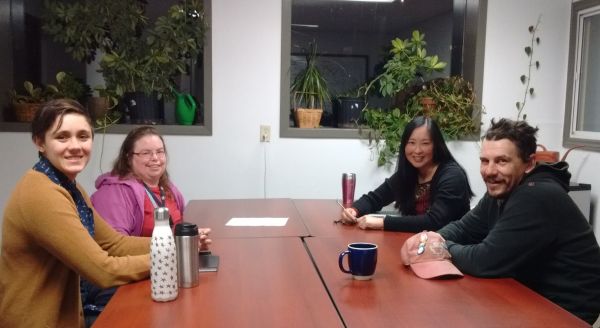By Kate Higginson, CFICE Communications Research Assistant
Many grad students enter their Master’s degree or PhD with the hopes of helping their community. Community-campus engagement (CCE) is one way students can maximize the community benefits of their research. CCE work requires a significant time commitment, and it can be difficult to balance one’s research interests with the needs of the community. But this type of research can be extremely rewarding and give a completely unique perspective to the community issues at hand.
CFICE spoke to Tessa Nasca who completed an MA thesis in community-campus engagement to get some tips on how to do a CCE-related thesis.
Choosing to first enter grad school, and then selecting a research topic isn’t necessarily the only order in which to do things. For Tessa Nasca, Trent MA Sustainability graduate, it was the community organization that called first. Nasca took a different route to their master’s research. Rather than starting as a student and choosing a project, Nasca found an initiative that was looking for a student.
Nasca worked with the Stewart Street Active Neighbourhoods Project, in Peterborough. Nasca was able to work with this participatory planning project, whose goals are to engage members of the community who are traditionally marginalized and excluded from planning processes of this nature. Their role was to help plan and implement the project, but also to allow for a participatory evaluation of the project, and this is what led to a thesis. Nasca’s graduate work offered a direct line to their future career, and they now work as a project manager for the Active Neighbourhoods Project at the Toronto Centre for Active Transportation.
Community-minded graduate students’ goals are often to support community-based projects that they are passionate about while at the same time attaining a degree and building a career. However, Nasca warns that doing a CCE based thesis might not be for everyone. It definitely takes a certain type of student to be able to undertake this work. It’s important that students ensure they are needed by the community. Working with a community project can require a significant amount of time and training, and students want to make sure they can work independently enough without requiring a personal on-the-job supervisor.

(From left to right) Tessa Nasca, Katie Caddigan, Nadine Changfoot, and Jason Hartwick meet to discuss the ANC Peterborough Project.
Speaking of jobs, pursuing a degree that involves CCE work is an extremely time-intensive process and students might find themselves putting in similar amounts of time that would be required for a full-time job. With respect to time, Nasca said, “Be prepared to put in more time than a lot of your peers,” at least at the Master’s level.
Students need to be prepared for the time investment that proper community-campus engagement demands. In order for the project to be mutually beneficial, students need to invest in creating meaningful relationships with the community partners. The effort towards building close relationships and maintaining a community-first perspective with the research can lead to rewarding results.
According to Nasca, GreenUP, the local coordinating organization behind Peterborough’s Active Neighbourhoods Project work, was “able to apply some of the evaluation results [from their master’s thesis] when seeking additional funding to scale-up the Active Neighbourhoods project approach. GreenUP was successful in acquiring a three year Ontario Trillium Foundation grant to scale up the project approach that we piloted and evaluated.” Funders tend to be attracted to the evidence-based approaches, and student research can help build this base of evidence to demonstrate the efficacy of a particular project approach.
If you’re considering doing a thesis that involves CCE, remember that the community comes first. Make sure you are passionate about the project, and that they are passionate about you. If you’re willing to put in the work, a CCE thesis can give you a direct path to an awesome career, and will allow you to help your community along the way!
